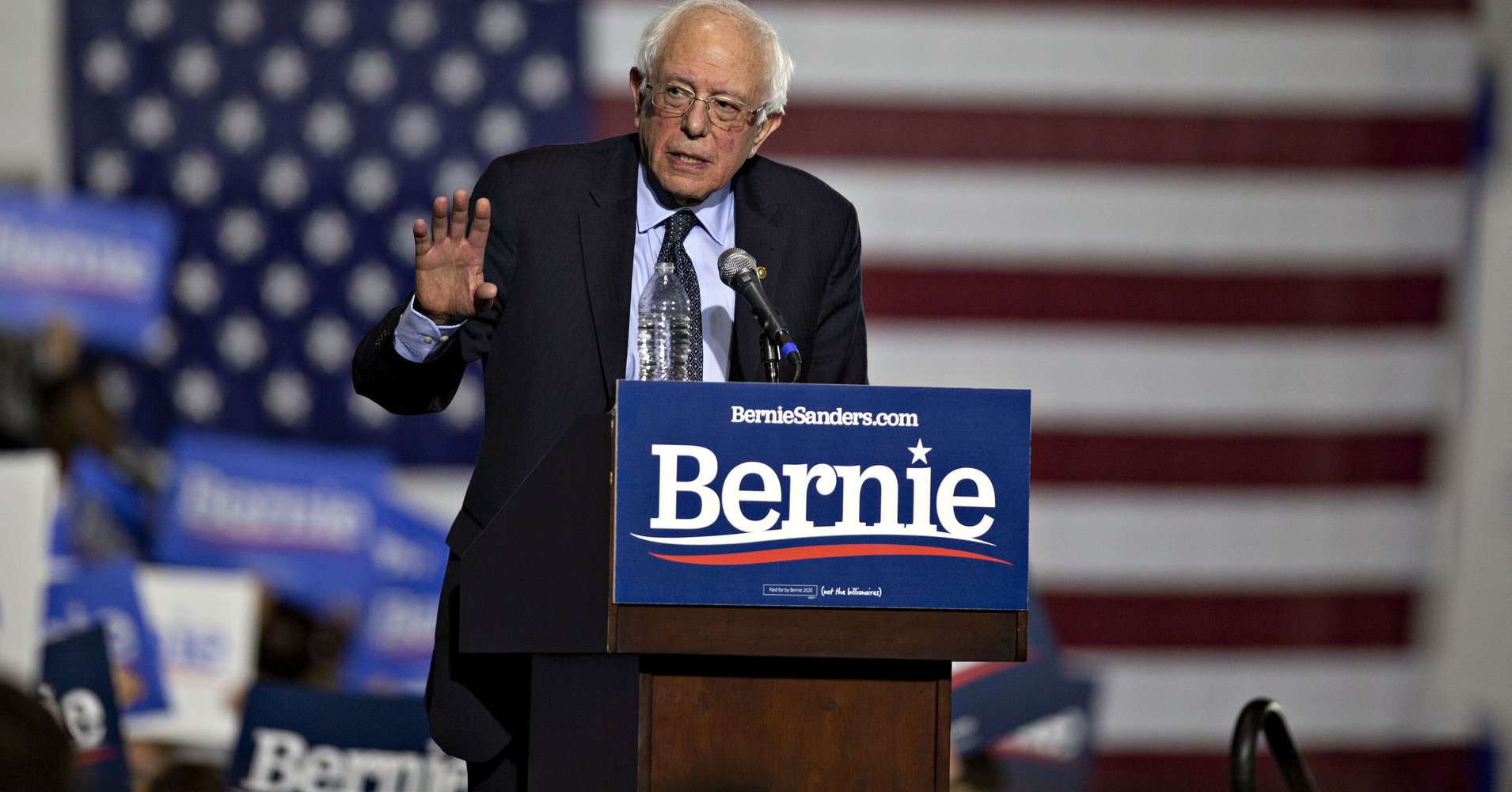[ad_1]
Sen. Bernie Sanders (I-Vt.) made racial justice a central theme of the first two rallies of his presidential campaign, a major shift from the launch of his 2016 presidential run.
“Have we made progress in civil rights in this country since the early 1960s when I lived here in Chicago? And the answer is: Yes, we have,” Sanders told a crowd of over 12,000 at Chicago’s Navy Pier on Sunday after delving into his civil rights activism at the University of Chicago.
“But do we still have a very, very long way to go to end the institutional racism which permeates almost every aspect of our society? And the answer is: Absolutely.”
Sanders’ deliberate focus on race at his rallies in Chicago and, a day earlier, in Brooklyn, New York, marked a significant departure from his rhetoric at an analogous event in Burlington, Vermont, where he kicked off his 2016 bid.
In that May 2015 speech, Sanders used the word “race” only once and did not address criminal justice reform at all.
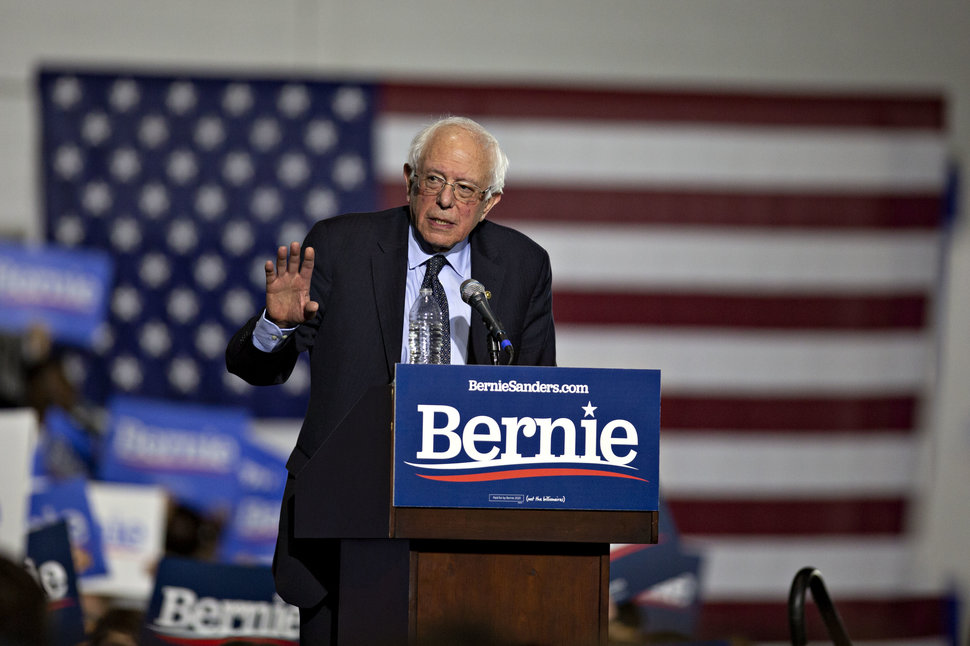
The dramatic rhetorical shift is part of a multi-pronged strategy Sanders is employing to address what he and his advisers see as one of the biggest weaknesses of his 2016 run: a lack of traction among non-millennial black voters and a perception that his focus on class barriers reflects an insensitivity to racial bias.
Since announcing his presidential run in late February, Sanders has announced a racially diverse roster of senior staff members and top surrogates, opened up about his history of participation in the civil rights movement, and put a greater emphasis on fighting racism as an evil in itself, rather than indirectly through economic policies.
It’s a shift that his closest allies have been encouraging him to make for some time.
The day after his landslide re-election to the Senate last year, Sanders gave a clumsy interview with The Daily Beast that overshadowed his victory and fed the narrative that he was a tone-deaf spokesman on matters of race.
Asked why black Democratic gubernatorial candidates Andrew Gillum of Florida and Stacey Abrams of Georgia had come up short in their bids, Sanders said, “There are a lot of white folks out there who are not necessarily racist who felt uncomfortable for the first time in their lives about whether or not they wanted to vote for an African-American.”
A spokesman for Sanders rushed to clear up the damage, clarifying that the Vermont senator had intended to blame the “racist” campaigns of Abrams’ and Gillum’s Republican opponents.
But behind closed doors, Sanders received a call from Nina Turner, a former Ohio state senator who served as one of Sanders’ top surrogates in 2016.
Turner, now president of Our Revolution, the progressive nonprofit that succeeded Sanders’ presidential bid, wanted to make sure he understood why what he said ― no matter what he meant by it ― was troubling to people.
“I said, ‘If somebody did not vote for [Gillum or Abrams] because of their skin color, that makes them racist ― whether they know it or not,’” she told HuffPost. “He got it right away. He said, ‘You’re right.’”
Turner attributed the initial mistake to Sanders’ open-heartedness: “He tries so hard to find some goodness in people.”
Sanders’ campaign declined to comment on the conversation.
The senator’s stumble soon faded from the headlines. It was a modest blemish on two years spent campaigning for black candidates, championing progressive prosecutors and introducing legislation that would end cash bail ― a policy that disproportionately punishes impoverished black men.
But Sanders and his inner circle know that if he is to win the Democratic presidential nomination, he still has to make up a confidence deficit among black voters.
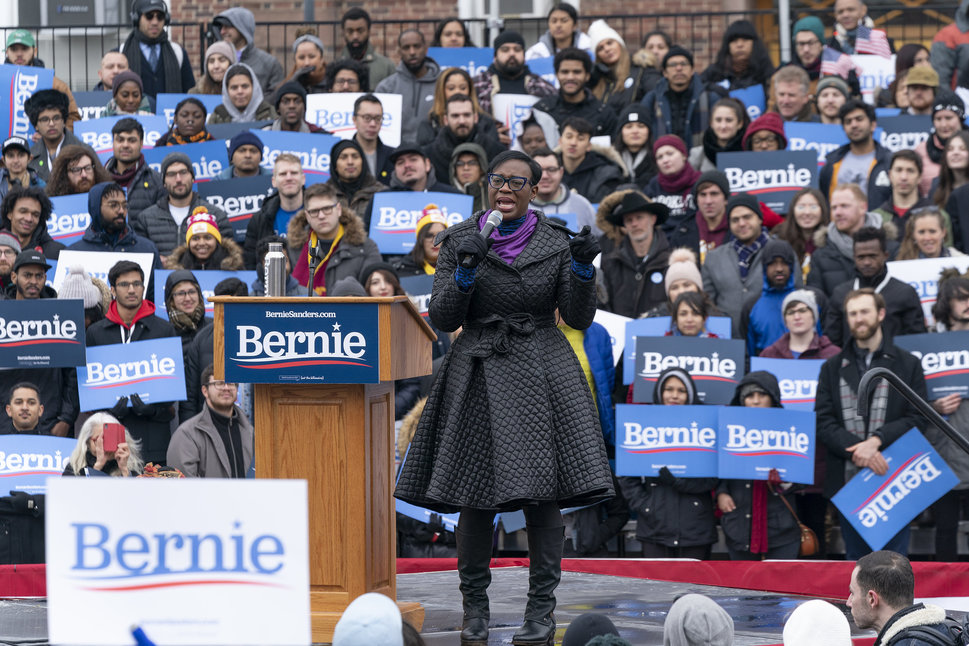
‘The Disparities Within The Disparities’
Former Secretary of State Hillary Clinton, Sanders’ 2016 primary opponent, argued that Sanders’ focus on economic inequality came at the expense of sensitivity to racial and gender barriers. Her subsequent sweep of Southern states where black voters make up an outsize share of the Democratic primary electorate fed a perception that this ideological disposition was costing him votes.
Sanders’ defensive reaction to protesters at the liberal Netroots Nation convention in July 2015 also invited criticism from some of the most prominent activists in the Black Lives Matter movement. Demonstrators interrupted his speech, demanding that he speak more specifically about police violence against black people.
“Black lives, of course, matter,” Sanders said, responding to “Black lives matter” chants. “I spent 50 years of my life fighting for civil rights and dignity, but if you don’t want me to be here, that’s OK. I don’t want to out-scream people.”
Some black activists expressed frustration that Sanders did not seem to bring the same anger and passion to issues of racial injustice as he did to economic inequality.
Now the Vermont senator and his allies are doing their utmost to staff his new presidential campaign with advisers of diverse backgrounds so conversations like the one he had with Turner can happen before he makes a public blunder.
For 2020, Sanders’ campaign co-chairs are Turner, Rep. Ro Khanna (D-Calif.), San Juan, Puerto Rico Mayor Carmen Yulín Cruz and Ben & Jerry’s co-founder Ben Cohen.
His campaign manager is Faiz Shakir, former head of the American Civil Liberties Union’s office in Washington, D.C., and likely the first-ever Muslim to head a major presidential campaign.
Other top staff positions have also gone to candidates of diverse ethnicities. Analilia Mejia, state director of the New Jersey Working Families Party and the daughter of Colombian and Dominican parents, joined the campaign as national political director; Sarah Badawi, an Arab-American and government affairs director of the Progressive Change Campaign Committee, was hired as deputy political director; and Belén Sisa, an undocumented immigrant activist, will serve as deputy national press secretary.
The campaign did not push this message out strong enough or deep enough.
Nina Turner, Sanders 2020 campaign co-chair
Khanna, the grandson of an Indian activist jailed alongside Gandhi for protesting British rule, said he would not have signed on as campaign co-chair if he did not believe Sanders was committed to combating racial injustice.
“One of the things I respect about him is his capacity for introspection and growth,” Khanna said. “And he realizes that the staff of the last campaign, as great as they were, needed to be supplemented with more diverse perspectives.”
In an interview on The Young Turks the day that Shakir’s hiring became public, Sanders himself admitted that the campaign’s personnel decisions were designed to correct a lack of diversity in his senior circle in 2016.
“We have been criticized, correctly so, for running a campaign that was too white and too male-oriented, and that is going to change,” he said. “We’re going to have a very, very diverse campaign staff and we’re going to do a better job reaching out to every community in this country.”
Despite the public perception, Sanders supporters believe the senator is truly sensitive to matters of race and is a champion of policies to help people of color.
As activist Shaun King writes, Sanders began his career in activism protesting housing and school segregation as a student at the University of Chicago, where he chaired the college chapter of the Congress of Racial Equality’s social action committee. A photo of his 1963 arrest during a demonstration against school segregation went viral when it emerged during the 2016 campaign. Tellingly, the campaign had been unaware of the photo before the Chicago Tribune found it in its archives in February 2016.
Twenty-five years later, in 1988, Sanders, then-mayor of Burlington, Vermont, became one of the only white elected officials in the country to endorse Rev. Jesse Jackson’s presidential run. Jackson would go on to win the Vermont primary with Sanders’ support.
In an April interview, Sanders told HuffPost that he backed Jackson because he believed in Jackson’s concept of the “Rainbow Coalition” ― a movement uniting workers of different races “around a progressive agenda which will significantly improve life for all Americans” ― and considered it the ideological successor of Martin Luther King Jr.’s Poor People’s campaign.
Jackson “was the progressive candidate and he was doing exactly that,” Sanders said.
Sanders again praised Jackson’s presidential runs in remarks at the Martin and Coretta King Unity Breakfast in Selma, Alabama, on Sunday morning. Jackson, who sat behind the speaker’s podium where Sanders delivered his remarks, spoke highly of Sanders during a brief conversation with reporters prior to the event.
Sanders’ endorsement of his 1988 bid “was a big deal,” Jackson said. “I respect him very much.”
As with health care and education, areas where the mainstream consensus has followed Sanders, the Vermont senator was ahead of the curve as a critic of mass incarceration, one of the most concrete manifestations of contemporary racial bias. He delivered impassioned speeches against tough-on-crime bills as a House member in 1991 and 1994, though he ultimately voted for the latter due to its inclusion of the Violence Against Women Act. (Then-first lady Clinton, by contrast, promoted tough-on-crime policies with language about bringing “superpredator” criminal youths “to heel” that activists lamented as racist dog-whistling.)
In keeping with those values, Sanders’ 2016 platform on reforming the criminal justice system drew activist praise for its boldness, including proposals to abolish private prisons and to “ban the box” that requires job applicants to list their criminal history.
But Sanders’ reputation suffered from older black voters’ affinity for Clinton, his reluctance to invoke race as frequently as economic justice in political speeches, and periodic gaffes that reinforced the image peddled by his centrist adversaries of an out-of-touch septuagenarian from lily-white Vermont.
Referring to Sanders’ historic criminal justice reform proposals, Turner said, “The campaign did not push this message out strong enough or deep enough.”
Turner acknowledged that some black Americans wanted him to articulate more clearly that African-Americans experience discrimination and worse life outcomes than white peers of comparable socioeconomic standing.
“He’s not new to understanding the dynamics of race. He does see economics as the fix,” she said. “But there are those of us who remind him that even with economics, there are some disparities within the disparities.”
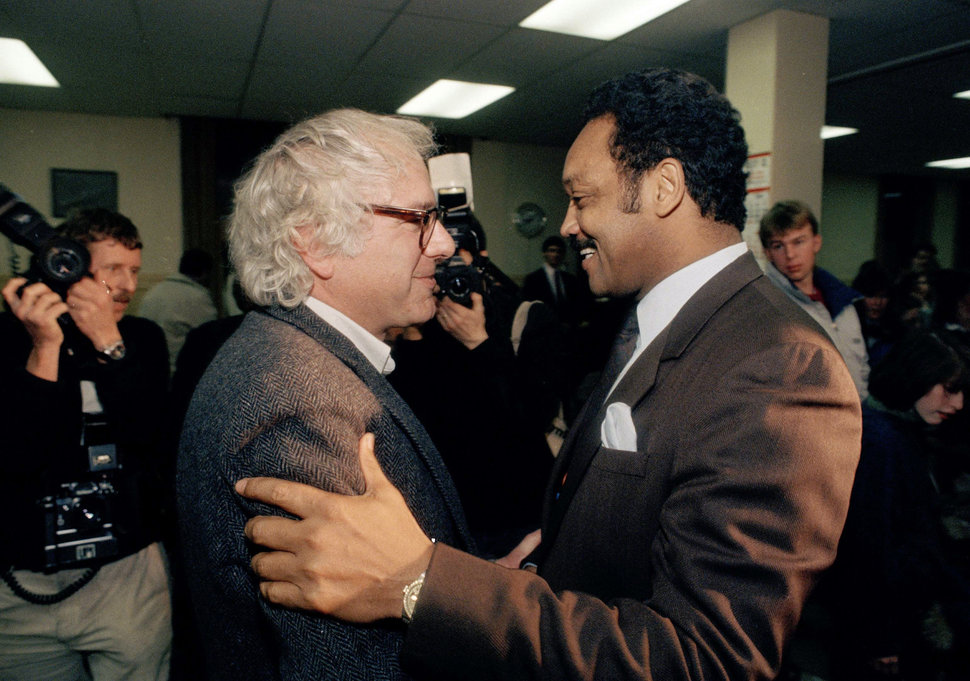
Stumbles On The Road To Redemption
After the 2016 election, Sanders sought to deepen his relationships with black elected officials and black candidates, particularly contenders for elected office who shared his progressive economic philosophy and anti-establishment bent.
Three early recipients of his support ― either directly or through Our Revolution ― were the black mayoral candidates Randall Woodfin of Birmingham, Alabama; Chokwe Antar Lumumba of Jackson, Mississippi; and Vincent Fort of Atlanta. Fort fell short, but Woodfin and Lumumba unseated more conservative incumbents.
Fort, a former state senator who backed Sanders in 2016 and has stayed in touch with his advisers, has returned as an ardent proponent of his bid.
After announcing his run, Sanders also reached out to Greg Edwards, an Allentown, Pennsylvania-based black pastor who ran unsuccessfully for Congress with Sanders’ backing. Edwards agreed to sign on as a supporter.
“His message of addressing the growing income inequality and economic disparities and being the progenitor of the Medicare for All legislation and creating a level playing field by addressing our nation’s ongoing imbalance of economic power, ring true in his policies but also in his person,” Edwards said.
“Bernie’s policies still are the policies that I think are going to move the needle in the nation, but specifically among historically marginalized populations,” he added.
Neither Woodfin nor Lumumba have weighed in on the presidential field. But Sanders’ relationship with Lumumba resulted in an invitation to speak alongside Lumumba at a panel discussion-cum-rally commemorating the 50th anniversary of Martin Luther King Jr.’s death in early April.
However, the event, intended to showcase Sanders’ versatility discussing King’s legacy of racial and economic justice, became another source of controversy for the Vermont senator because of remarks he made about former President Barack Obama.
Obama “was obviously an extraordinary candidate, brilliant guy,” Sanders said. “But behind that reality, over the last 10 years, Democrats have lost about 1,000 seats in state legislatures all across this country.”
Although Sanders echoed many Democrats’ critiques of Obama, some prominent black Democrats criticized the comments as inappropriate for the occasion, sparking a debate anew about Sanders’ ability to communicate with black voters.
Lumumba, a proponent of worker-owned cooperatives who shares Sanders’ populist economic vision, did not see it that way.
“Sometimes we have to separate our admiration for a person and what they’ve done from structural critiques,” said Lumumba, who believes that Obama, like other presidents, was constrained by the influence of multinational corporations on the modern presidency.
At the very least though, the media coverage of the story deprived Sanders of an opportunity to burnish his reputation rather than defend it once again.
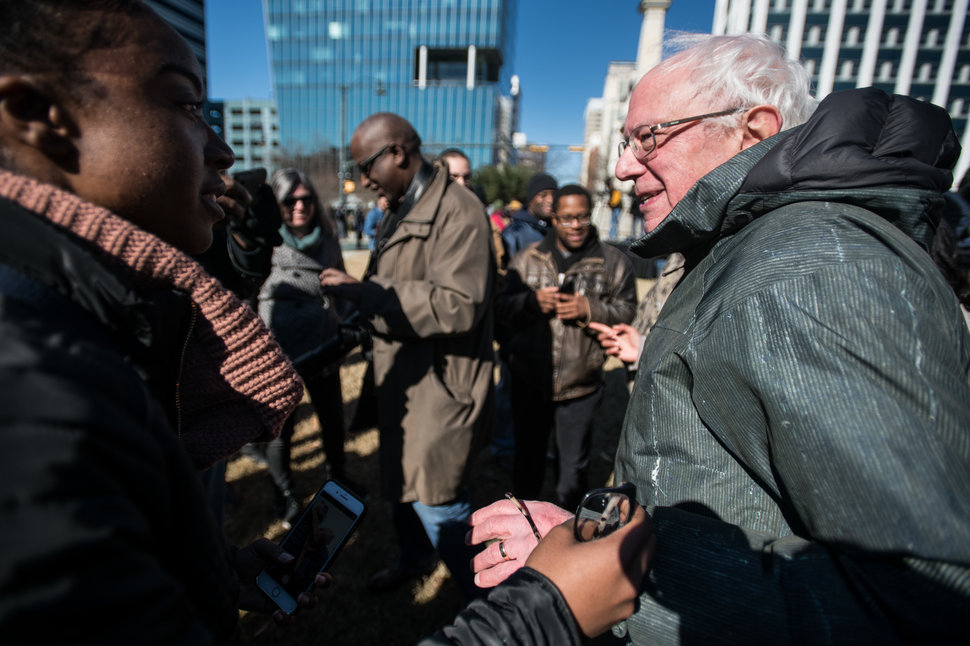
Finding His Footing?
Sanders finally appeared to be turning a corner with an MLK Day speech in January to the South Carolina NAACP that went off without a hitch. In fact, Sanders’ remarks elicited a warmer response than a speech delivered by Sen. Cory Booker (D-N.J.), a presidential rival who would be the nation’s second black president if elected.
That same trip, Sanders addressed a packed audience of students at the historically black Benedict College and met privately with members of the South Carolina legislature’s black caucus, at least one of whom praised him for learning from his first presidential run.
Sanders has also grown more comfortable discussing the legacy of racial discrimination as a challenge that cannot be explained by economic disadvantages alone.
At a CNN town hall on Feb. 25, a questioner confronted Sanders directly about some black voters’ skepticism toward him. In response, Sanders delivered what may be his most articulate analysis to date of the way historic and present-day discrimination magnifies black Americans’ experiences of the economic inequality gripping the county.
“Maybe I haven’t been as strong on this issue as I should be,” Sanders admitted, in an apparent reference to his rhetoric. “I talk about the fact that we have a nation of massive inequality ― and I believe that. I think that’s the most important issue we can talk about. But within that inequality, we have another inequality, and that is racial disparity.”
“I will work as hard as I can, No. 1, to have a Cabinet that reflects what America is, and No. 2, to do everything that I can in every way to end all forms of racism in this country,” he added.
His language echoed Turner’s use of the phrase “disparities within disparities” in her interview with HuffPost hours before the town hall, suggesting her influence has had an impact.
Sanders is fond of reminding voters that he won the votes of more young people of color in 2016 than Clinton and Donald Trump combined. (It’s almost certainly true; an analysis of exit and entrance polling showed that he won more votes from people under 30 of all races than Clinton and Trump’s combined total.)
The increased name recognition that Sanders’ first presidential run afforded him has also earned him strong support among black Americans overall, according to public polling. A January 2018 survey conducted by Quinnipiac University found that Sanders’ net favorability was higher among black voters than any other demographic group, with 70 percent of African-Americans surveyed holding a favorable view of him.
I’m optimistic that in 2020, African-American voters are going to give Bernie a chance to make the case.
Vincent Fort, former Georgia state senator
Fort, the former Georgia state senator, believes that Sanders is positioned to make inroads with the black vote, notwithstanding the presence of two black candidates ― Booker and Sen. Kamala Harris (D-Calif.) ― in the race.
“I’m optimistic that in 2020, African-American voters are going to give Bernie a chance to make the case,” Fort said.
Bill Fletcher, a former president of TransAfrica Forum who identifies with Sanders’ economic and foreign policy visions, voted for the Vermont senator in the 2016 primary. But Fletcher, who is African-American, still wants Sanders to make racial injustice, as an issue in itself, a more prominent feature of his message.
“It’s not just the diversity of the people around him. He needs advisers that basically can say to him, ‘This is what you need to say,’” Fletcher said.
One way that Sanders’ team plans to deepen his appeal with black voters, as well as the broader electorate, is by having Sanders discuss his personal life and history more freely. The Vermont senator is a famously private person who has often, though not always, avoided volunteering information about himself.
Sanders showcased the new approach in Chicago on Sunday, recounting at length his work protesting housing and school segregation as a leader at his college’s chapter of the Congress of Racial Equality in the early 1960s.
“The reason I tell you all of this is because my activities here in Chicago taught me a very important lesson,” Sanders told the crowd. “And that is that whether it is the struggle against corporate greed, against racism, sexism, homophobia, environmental devastation, or war and militarism ― real change never takes place from the top on down. It always takes place from the bottom on up.”
[ad_2]
Source link

